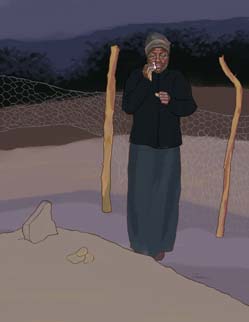
AFRICA CLOSEUP / FAITH
TALKS ABOUT AIDS
| Introducing Faith |
| Masiye Camp Explained |
| The Splashgirls |
| The Swiss Connection |
| Faith talks about AIDS |
| Faith and Volunteering |
| Ezekiel Mafusire, Masiye Camp Director |
| Faith and School |
| Faith Visits Her Rural Home |
| Faith at Home |
| About |
| Contact |
Copyright
2005 Zina Saunders All rights reserved |
AIDS has killed Faith's mother, aunt, and stepfather. Her job, her family, her studies, her country, her future, have all been shaped by the AIDS epidemic rampant in Africa.
Talking about the change in attitude towards AIDS, Faith says, "Before, people used to be depressed and down, and when AIDS got into their families they'd be shocked. But those days are gone. It's now normal. People are now taking it as part of life."
And the health system is incapable of handling the problem. "I think more than 65% of AIDS patients are at home because mostly there is a belief that there is no reason for them to be at hospital because there are no drugs and it's obvious, if someone has AIDS, he is going to die," she says.
"The thing is, the doctors don't tell you that you have AIDS. Usually,
no matter how sick you are, they prescribe some drugs for you and they
discharge you and most people can't afford them and they just go home
and sleep."
The doctors' silence may be contributing to the spread of AIDS; by not
revealing the true diagnosis, there's no hope that patients will take
any precautions about infecting others.
"I don't know why doctors won't tell people that they have AIDS,"
Faith says, but she has a theory:"Maybe they think people will commit
suicide or think that it's the end of the world.
"The worst thing is we have more patients than drugs, here."
She certainly knows that Anti-Retroviral drug treatments would dramatically
help those with HIV/AIDS, but they aren't available, "I don't know...
the hospital system these days, maybe they have ARV's, but people can't
afford it. Some have the best and some have none at all."
Discussing the general attitude toward AIDS, she said, "We do talk
about AIDS, with relatives and with friends. But we never, ever say a
person has AIDS, even if that person is sick to the last, unless if that
person reveals his status himself."
When describing her parents' death, she says, "My stepfather died
from a migraine headache, which they think is a complication of HIV/AIDS.
And my mother, [when] she passed away when I was 19, she also had a migraine
headache."
She explains, "This side it's offending to say someone has AIDS,
I dont know why. Maybe its embarrassing, I don't know.
"But after that person has died, that's when people start saying
it was AIDS. But they will be saying it secretly -- unless if that person
had become public about his status. If he hadn't become public, you would
never talk about it."
The polite silence on the subject doesn't hide the truth."But of
course you can see that someone has AIDS," Faith observes.
When asked about young people and romance, she says, "That hasn't
changed. People are still going out, young people are still playing, but
now they know the truth."
What they do with the truth, is another thing, "You see, if you're
a young person, and you have everything at home, you don't think about
the bad stuff, or about bad things happening to you. You only realize
after, because it has happened to you."
And she thinks it's particularly hard on girls when their parents die,
"Most young women don't...I don't know if it's that they don't think
they have the opportunities, or they think when they lose someone they
love, that it's the end of life. They don't have anyone to encourage them.
It's very hard for them." Very, very hard, indeed; the World Health
Organisation reports that Zimbabwe's women have the lowest life expectancy
on the planet.
